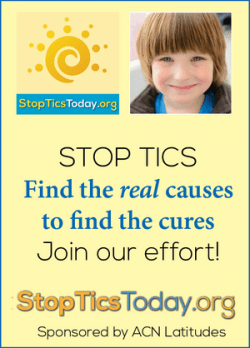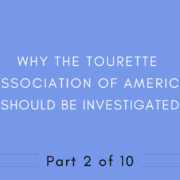Why the Tourette Syndrome Association Should be Investigated: Special Report March 2015
Why the Tourette Syndrome Association Should be Investigated: Special Report March 2015
TSA Sounds Off on Integrative Therapies
We completed our 10-part series on why the Tourette Syndrome Association (TSA) should be investigated in June 2014. In it, we outlined how, after 40 years and countless  millions of dollars, the TSA has neither found the cause of this condition nor safe and effective treatments. Meanwhile, the incidence of the condition has been skyrocketing.
millions of dollars, the TSA has neither found the cause of this condition nor safe and effective treatments. Meanwhile, the incidence of the condition has been skyrocketing.
Further, we asserted that the TSA discourages families from pursuing non-drug approaches and has disregarded reports to them from families and physicians who found success with integrative therapies.
A new 11-minute YouTube video: TSA Roundtable Discussion on Complementary and Alternative Treatments for Tourette Syndrome (March 18, 2015) appears to be an attempt to justify TSA’s lack of positive action in this area. The panel clearly struggles with the issue, but in the end not one helpful suggestion is made for patients to help them reduce symptoms without standard drugs.
The moderator admits that families are “frightened” by drug therapies for Tourette’s, yet the viewer is repeatedly warned that integrative or complementary therapies can be dangerous and expensive.
See the video here and judge for yourself
TSA’s view of complementary therapies:
We’re told in the video that the status of integrative medicine is like the “wild, wild West” and it’s 50 to 60 years behind Western medicine. Yet ACN Latitudes often focuses on are digestive health, laboratory testing, neurotoxicity, environmental factors, diet and nutrition, chemical sensitivity, immune issues and allergy—all considered Western and contemporary the last time I checked.
While a participant says there are some helpful “nuggets” within non-drug approaches, viewers are not told what those might be.
The panel complains there are no randomized double-blind studies for alternative or complementary therapies, yet they fail to address the fact that the lack of these studies is a direct result of the TSA’s failure to encourage research in these areas. It’s a vicious cycle that TSA has appeared to be in no hurry to break.
TSA is way behind the curve
The first large study on omega-3s/fish oil and TS is touted in the video. There are already hundreds of published reports on the use of omega 3s for ADHD and depression, beginning 15 years ago.
The TSA’s effort is a belated beginning, after a previous small study they funded on fish oil that was non-conclusive due to a poor study design. But beyond that, one could question why hundreds of studies have been conducted on fish oil/omega 3s for depression and ADHD. In part, one explanation is that studies of single nutrients often end with mixed results, and the conclusion is that “more studies are needed.” A reason for this is there is not a single biomedical profile for everyone with a given diagnosis. Underlying causes of the condition and individual nutritional needs vary, and the way the body assimilates a given nutrient is complex.
Kick start Tourette research with StopTicsToday
 There’s no time to lose! We need new research efforts for Tourette syndrome now. We will work with leaders in the field of conventional and integrative medicine to develop studies addressing new and safe avenues to prevent and treat tic disorders. But we can’t do it alone. We need your support now!
There’s no time to lose! We need new research efforts for Tourette syndrome now. We will work with leaders in the field of conventional and integrative medicine to develop studies addressing new and safe avenues to prevent and treat tic disorders. But we can’t do it alone. We need your support now!
ACN Latitudes needs to raise research funds to move comprehensive treatment of tic disorders forward. Our project StopTicsToday needs your support.
Please help us! We are looking for a professional fundraiser, grant writers, article writing, fundraising through our Fundly page, and help with social media.
*Interesting note: Roundtable participants are listed as John Walkup, MD; Samuel Zinner, MD; Tanya Murphy, MD, PhD; Lawrence Scahill, MSN, PhD; Jorge Juncos, MD; and Cathy Budman, MD. However, any comments that may have been made by Drs Murphy and Budman during the actual roundtable discussion are not included in this PR piece.










Sheila, I think what you and ACN are doing is really great. I don’t know how you’ve managed to keep up the effort all these years. I have made a donation and hope that it will support your efforts in making drug-free approaches a viable option for so many families and patients dealing with tics and tourettes. Not that there’s a problem with drugs per se, but the ones for tourettes that TSA docs use leave a lot to be desired. We need more people like you advocating for new therapies related to diet and environmental factors and how they affect our health. I know you cover other areas as well, but those seem to be a no-brainer for getting started in figuring out why this condition is growing in numbers so much, and what can be done about it to help. I think you’re right to move on with your own fundraiser. Good luck!
Thanks for kind words, RW, and your donation which is much appreciated. It’s been a long effort, as you say. We’re at a point where we really need some volunteer help to keep the message going, and definitely need to raise funds to get some substantial research going. Hopefully we will make some progress soon!
Your article above is spot on. I have also run into the closed mindedness of the medical community in our (so far) 5 year journey to dig out from under the TS/OCD/ADHD diagnosis given to our identical twin boys in 2010. I grew up in the 1970’s, during an era that promoted Flintstones vitamins as just a basic part of life. I actually used to feel guilty if I forgot to give it to my kids when they were little! Imagine my surprise when I was told by our neurologist, with disdain I might add, that “we don’t do all that natural stuff in this practice”. I had just asked her about the proper dosages of B6 and magnesium for an 11 year old. I had been researching about additional things we could do for tourettes, to add to the medicine she was prescribing. All I needed was the dose for an 11 year old. I was completely taken aback by her comment. As the years have progressed, I have heard things like “that’s just anecdotal”, or “there is not a double blind study on that, so you shouldn’t try it!” Where have doctor’s brains gone? I, for one, don’t have time for a double blind study to come along while we are living in the middle of a double tourettes and OCD diagnosis! Lest we forget, the therapies that modern medicine think of as mainstream all started as anecdotal sometime or other! Keep up your good work and don’t forget that you are far more powerful and far reaching than the TSA could ever hope to be because you have what’s true on your side. :)
Your experience speaks volumes, Johanna. Thank you so much for sharing it with us. It’s unfortunate that physicians have not been taught much about nutrition and supplements in med school, and many get defensive; maybe that is changing with current students? We can hope at least. You’re so right that mainstream practices often grow from anecdotal reports. To be fair, this is recognized in the TSA video. But the problem is, the TSA consistently ignores or downplays these reports. If the TSA isn’t going to act on them, who do they think will? (Us I guess, but we need to raise the funds first!!) For sure there is no time for you to wait around for double-blind studies for your kids, especially given their their double diagnosis! I hope you have been finding the help you need for both your sons. And thanks so much for the encouraging words.
It’s a shame when those who have a prominent voice in a community aren’t spreading the whole truth — and it’s even worse when they’re putting out misinformation. The voice of ACN may not be louder than the TSA yet, but your message is definitely getting out there and I hope it continues to gain momentum through your ongoing efforts. When we know better, we do better. And you’re doing great!
About 7 years ago, when my son was diagnosed with Tourettes, idiopathic utitcaria and then had 13 cavities , I received no guidance from the numerous doctors and allergists he saw. I did a quick internet search and came up with gluten intolerance. I took him off gluten and he hasn’t had hives since, his teeth are much better and for a while his ticks went away all together. The allergist had him tested for Celiac disease and when he tested negative told me that there was no reason he couldn’t include gluten in his diet. We tried to introduce it back in and everything came back. I then found your book and wanted to buy a copy and give it to each doctor that we had seen and ask them why they wouldn’t give their patients this information. Please keep up the good work and I plan on donating to a very worthy cause.
Claudine, this is Ramya from Florida, my son started multiple tics before 2 months. Can’t able to say my state in words, feeling so frustrurated. How did you find gluten intolerance will cause tics. If possible can u give me your mail id please u need to talk to u please
Interesting! I am a PhD candidate in music education and attended the 1st World Congress in London this summer where I submitted a poster presentation. My research involves the influence of musical engagement on TS symptoms. Although there seemed to be progress into the Comprehensive Behavioral Intervention for Tics (brochure labeled CBIT) and well-attended sessions on the matter, one area was clearly over-looked. Two Dentists from different parts of the world had video and research to suggest that TS may not be a neurological disorder at all but a biological one easily treated with a mouth-piece. Their research MIGHT support mine in that I noticed that musicians who played brass instruments had higher decreased symptoms activity(possibly due to the embouchure and mouth position of the instruments) over piano players or guitar although my study is not yet published. Wouldn’t this also explain athletes with decreased symptoms who often wear ‘mouthpieces’ for protection? My inquiries/email to the aforementioned organization folks in leadership have gone unanswered. I’m very interested in your thoughts! Thank you!
Thanks for your comment, Chris. I agree CBIT is getting attention these days. But there are plenty of other areas that need attention. While there are some with physical issues (such as jaw alignment) that seem to be an underlying cause, there are others who don’t fall in that category. I think a big problem is the tendency to lump anyone with symptoms typical of Tourette’s under one huge umbrella when there are no doubt multiple causes involved, and sometimes overlapping. What have your findings been as far as music and tic control? Can you tell us more?
My survey targeted musicians with Tourette’s and asked if they noticed a symptom change when engaged in their musical activity (as opposed to passive listening). I also have data for what type of instrument they play (or sing). Given the current volume of neurology research I was expecting more cessation with the bi-manual activities or drumming for example, which I assumed had a greater causal effect, however the opposite was true. The brass or woodwind players (for the most part uni-manual) had greater cessation than others which seems to support the jaw alignment theory of Stack/Sims (Dentists) verses the neurologists. I’m trying to finish the paper now, so more will come soon. Thanks for your reply!
Chris